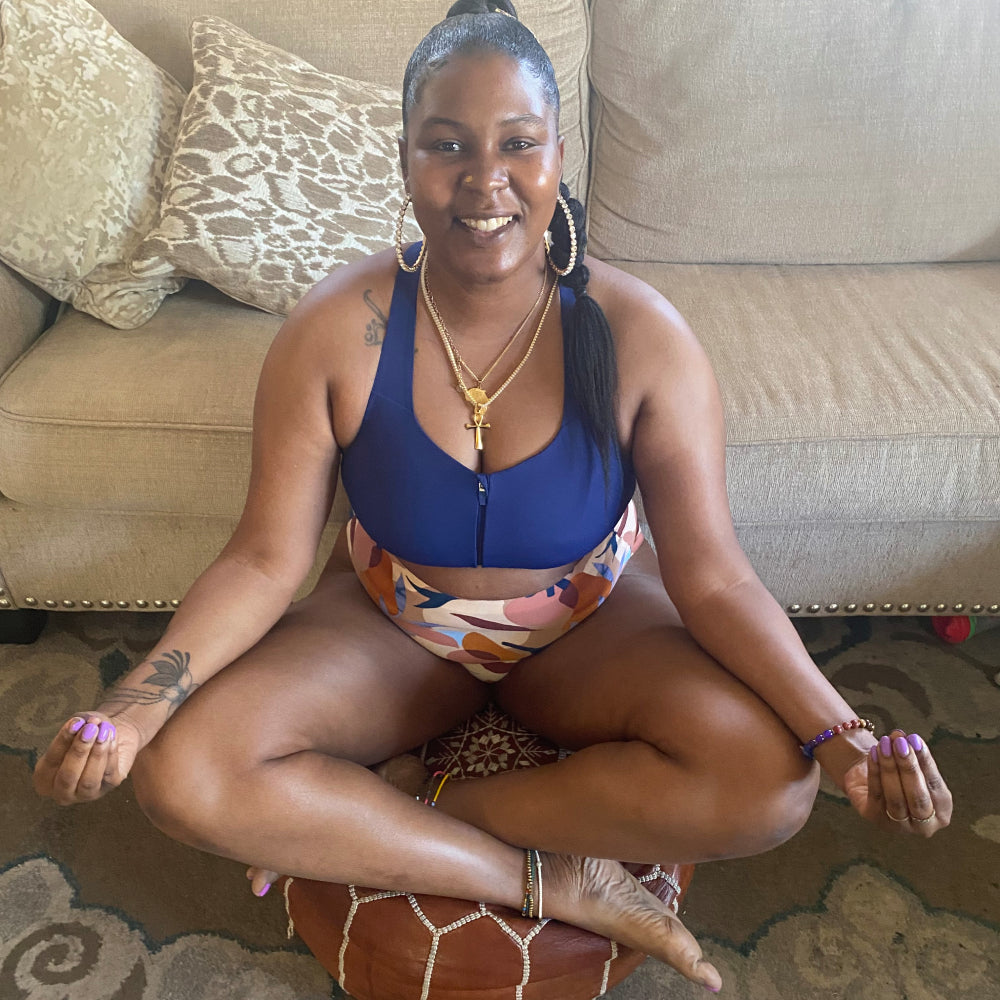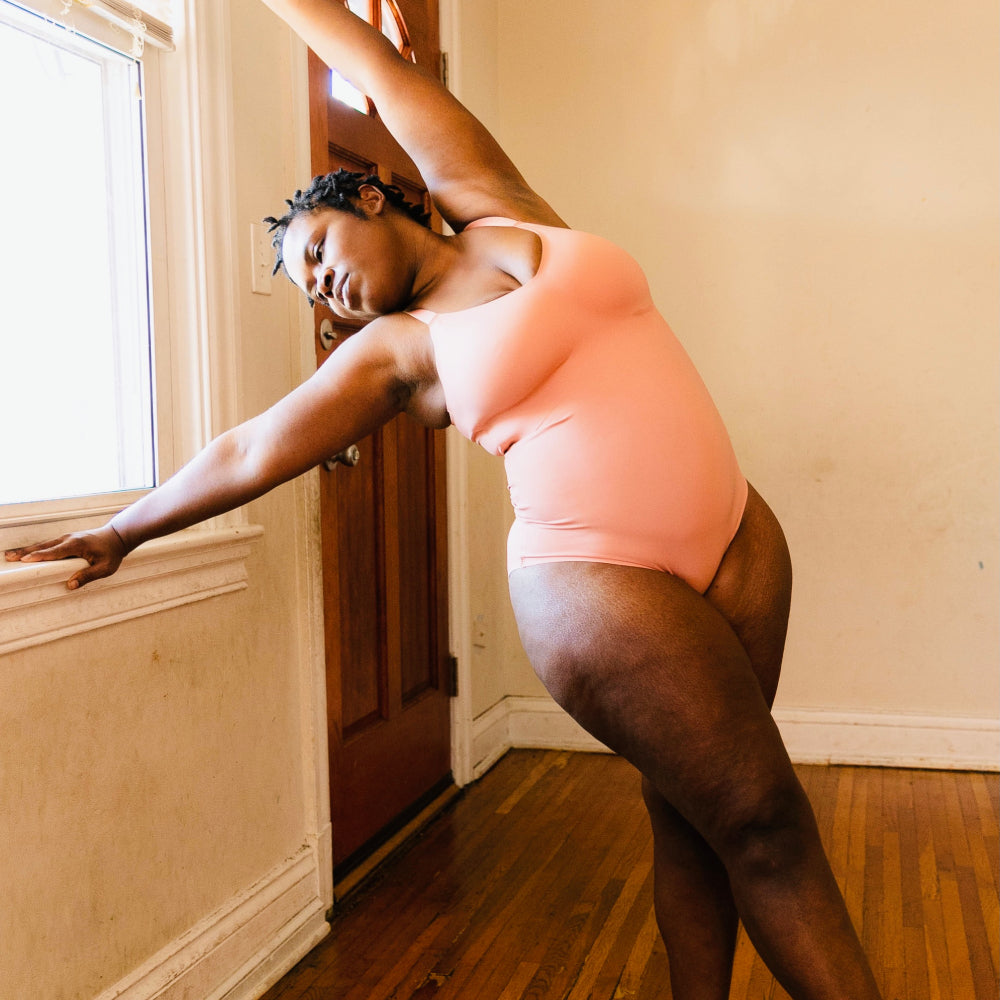4 Doulas Who Are Making a Difference
Last May, we announced our partnership with the Black Women's Health Imperative (BWHI) to create NOURISH, a postpartum Doula training program designed to support Black birthing families.
In the hopes of fostering positive birthing journeys and flattening the maternal mortality rate, Knix committed an initial $75,000 in scholarships to BWHI — in addition to ongoing proceeds of $1 from every item purchased from our Maternity and Postpartum Collection.
Nearly a year later, 26 Doulas have been receiving training and working hands-on with birthing families as part of the program. As the NOURISH program's first cohort of students approach their graduation date in May, we caught up with some of the incredible facilitators who are guiding the next generation of Doulas.
Mavhu Hargrove, Postpartum Doula

(Mavhu Hargrove wearing the HiTouch High Rise Legging and Good to Go Seamless Tank in Peppermint)
On her day-to-day: I offer online educational courses to birthing parents and birth workers. My courses share Indigenous Zezuru practices and customs surrounding childbirth and postpartum. Using these models of care, I help my students plan more holistically for their own (or their client’s) postpartum journeys.
On the inspiration behind her work: I’ve always helped women in my community and family when they had babies but was inspired to become a Postpartum Doula when I became a grandmother. I had my first baby while living in my motherland, Zimbabwe, and took the support I received for granted.
After coming to America and getting married I received the same level of support from my African American family, but I realized that not every birthing parent has the support they deserve. Becoming a Postpartum Doula is my contribution towards changing that.
On what she finds most rewarding: I feel rewarded when people leave my classes feeling empowered with the understanding that when we support and care for the birthing parent, we are gifting them the energy and brain space to care beautifully for their babies.
On the importance of Doulas: Doulas provide important support to parents by sharing their knowledge, resources, and experience — but the most important support we provide is being the voice that encourages parents to trust themselves to make good decisions.
This is especially important for Black birthing families. When you exist in a space that at times negates you, you need an advocate — someone who can hear and see you without bias. Unfortunately, we know the results of being unseen and unheard during birth and postpartum can be terrible.
On guiding a new cohort of Doulas: It’s both exciting and humbling. It’s exciting because I learn from everyone I encounter and it’s humbling because I feel that in helping to guide a new cohort of Doulas, I am helping to plant a tree of care and love that my pregnant great-grandchildren will sit under.
Erica McAfee, Maternal Child Health Advocate and Birthworker Educator
 (Erica McAfee wearing the Merino SculptWool Seamless Top and Legging in Dark Cherry)
(Erica McAfee wearing the Merino SculptWool Seamless Top and Legging in Dark Cherry)
On her day-to-day: My day-to-day involves working with clients who need support through birth, postpartum, or bereavement. I also plan, schedule, and record the Sisters in Loss Podcast, and manage our online community and grief support groups.
On the inspiration behind her work: My own birth story inspired me to become a Doula and help other Black women and women of color not feel fear or experience trauma during pregnancy, after experiencing loss, or receiving an infertility diagnosis. Black women can have positive, powerful birthing experiences.
On what she finds most rewarding: The most rewarding part of my work is being a voice for the voiceless and giving those a voice to share their story. There is so much power in storytelling to bring forth advocacy, change, and activism within the birthing and reproductive justice communities.
On the importance of Doulas: Doulas provide emotional, physical, and mental support to birthing families. Bereavement Doulas like myself help families welcome their baby, say goodbye, create rituals and memories, and begin the grieving process by connecting them to a licensed maternal mental health professional or grief support group.
Doulas are especially important for Black birthing families who need support to navigate the health care system so they can be seen, heard, respected, and listened to no matter their socioeconomic status or insurance capabilities.
On guiding a new cohort of Doulas: It feels empowering to teach a new cohort of Doulas to support those who feel left out, lost, and unheard. When we help those who are marginalized, we help everyone.
I believe Doulas are a vital step in improving the maternal mortality and morbidity and infant mortality rates in this country. However, we still have to work to dismantle institutional and structural racism in our healthcare system.
TaNefer Camara, Doula and Lactation Consultant
 (TaNefer Camara wearing Leakproof High Rise in Work of Art and Catalyst Front Zip Bra in Navy)
(TaNefer Camara wearing Leakproof High Rise in Work of Art and Catalyst Front Zip Bra in Navy)
On her day-to-day: As a Doula and Lactation Consultant, my work consists of 3 major parts: education, direct support, and program development. I train new and aspiring Doulas, Birthworkers, and expecting parents on lactation, breastfeeding, and postpartum wellness. I also am the Co-Founder of the Black Course: a 45-hour foundational lactation education course.
I assess both mom and baby. I review their birth and health history, observe feedings, and work on any issues they may be dealing with. I talk to my clients about their support system, any feelings that are surfacing for them and collaborate to provide a plan.
On the inspiration behind her work: I became a Doula in 2006 to address the maternal and infant mortality and morbidity rates in my community. That year I also birthed my first child. I saw a huge void in the cultural component of maternal care and wanted to fill it. I was inspired by an article I read about the history of Black Midwives in the rural South.
My own experiences as a young Black woman, pregnant and needing deeper care that was more culturally aligned inspired me to continue this work. I saw a need for greater support in the area of lactation and breastfeeding, so I pursued that path further.
On what she finds most rewarding: The most rewarding aspect of the work I do is seeing new moms come out of that period of confusion and exhaustion and emerge as more confident and proud parents. I love to witness the transformation of my clients, seeing them and their babies thrive is why I do this work. It's like watching a caterpillar transform into a butterfly.
On the importance of Doulas: Doulas provide families with immeasurable mental, emotional, and spiritual support. This is especially important for Black families because of the racism within healthcare and our society, in general. We are returning to what we did before, which was to rely on our own community for our survival and revival.
On guiding a new cohort of Doulas: It feels amazing to be guiding a new cohort of Doulas. This work is not about keeping the knowledge to ourselves, it is about passing the torch to the next generation of Birthworkers, Lactivists, and Healers.
Mother Mother Binahkaye Joy, Lactation Counselor and Movement Facilitator
 (Binahkaye Joy wearing the LuxeLift Bodysuit in Pink Ginger/Photographed by Colin A. Danville)
(Binahkaye Joy wearing the LuxeLift Bodysuit in Pink Ginger/Photographed by Colin A. Danville)
On her day-to-day: I spend most of my days dancing by the light of the sun, bouncing around with the munchkins, nourishing babies from my body, and nurturing my children’s brilliance and discoveries at Wildseed, our family learning lab practice. As a Mother Mother, I hold space for the mothers in my community and dream up innovative ways that the world can be a softer, sweeter, and more lovingly vibrant place for mothers.
On the inspiration behind her work: I was in the waiting room because a dear friend had called and asked me to come to the hospital. I didn’t know she was going to invite me into her birthing room. I felt unprepared to be what I thought she needed, but just like that: I was sitting with her face-to-face, holding her hand through the contractions.
I was amazed at how much support my presence brought. I listened to myself as unrehearsed scripts of affirmations of her strength and beauty poured effortlessly from me. I just kept reminding her that she could do this, and how amazing a mother she already was.
It was a heart-warming, middle-of-the-night birthing moment. There was so much love to celebrate, and yet I was very troubled by the way my friend was being pressured to get an epidural even though she repeatedly said she didn’t want one.
I was horrified at the rough manner in which a nurse handled her body just moments after giving birth, wrenching her belly to speed up the shrinking of her uterus. It was a lot to process, and I felt certain then, birth is sacred and holy. There has to be a softer, more gentle way for me to give birth when it’s my turn.
On what she finds most rewarding: I love witnessing people give birth, in all the ways that can happen. I love giving birth myself — to my children, ideas, programs, language, and the communities and dreamscapes I create.
All of my labors seed more love, joy, and discovery in the world.
If there are no adequate words for what I am experiencing, for what I need to share, then I create the language. If there is no space for my reality or my story, then I nurture that space until it is tangible. If the community is yet to be born, then I find that community within myself, within my own stories, and I affirm myself for as long as it takes to reach others who are looking for such a communion.
On the importance of Doulas: For many Black families, Doulas are reintroducing sacred birthing knowledge and ancient technologies that would otherwise continue to be unremembered. In this way, not only are Doulas serving mothers, they are seeding futures and regenerating cultural memory.
As we continue to dream a new world forward where all mothers and babies can be well, Doulas are laboring in the gap in the most essential of ways. Doulas represent the beginning of a vital reimagining. They perform fragments of a support system that has been intentionally fractured.
Doulas help mothers and their families remember, bit by bit, how to love someone who is giving birth, who is carrying new life into the world. Doulas bring visibility to life-saving, care practices that every family needs to know.
On guiding a new cohort of Doulas: It is an honor to be a part of the NOURISH Doula Program! I cherish every opportunity I have to witness the brilliance of those who feel called to serve mothers and their families. I love sharing my stories and encouraging Doulas to lean into the power of their stories when discovering their path into this work.
As we cultivate more learning spaces for Doulas, we are also emphasizing the importance of everyone’s wellness, care, and respect. When designing our birthing support networks and systems we get to be intentional about building a better practice for this generation of Birthworkers and those to come.
Being a member of the NOURISH team is a beautiful synthesis of years and years of finding my own way as a mother. I celebrate this labor that continues to light my way. I am so grateful for the space to create, dream, share, witness, and support.
You can read more about Mother Mother Binahkaye Joy here.










